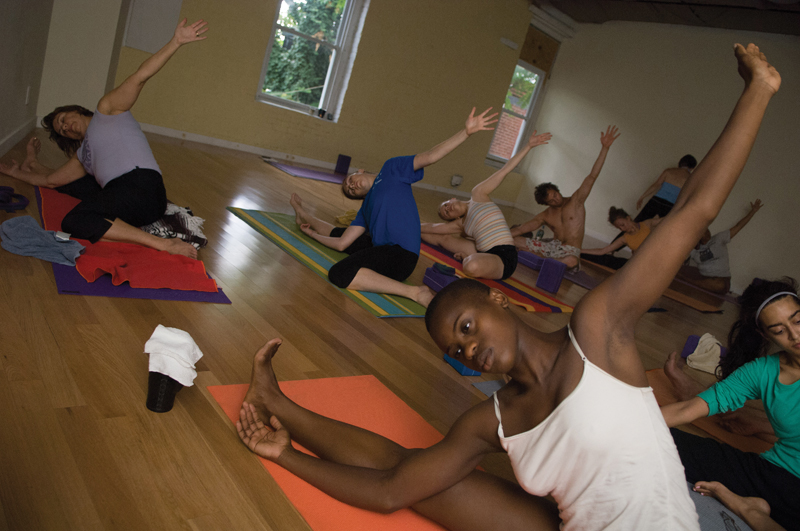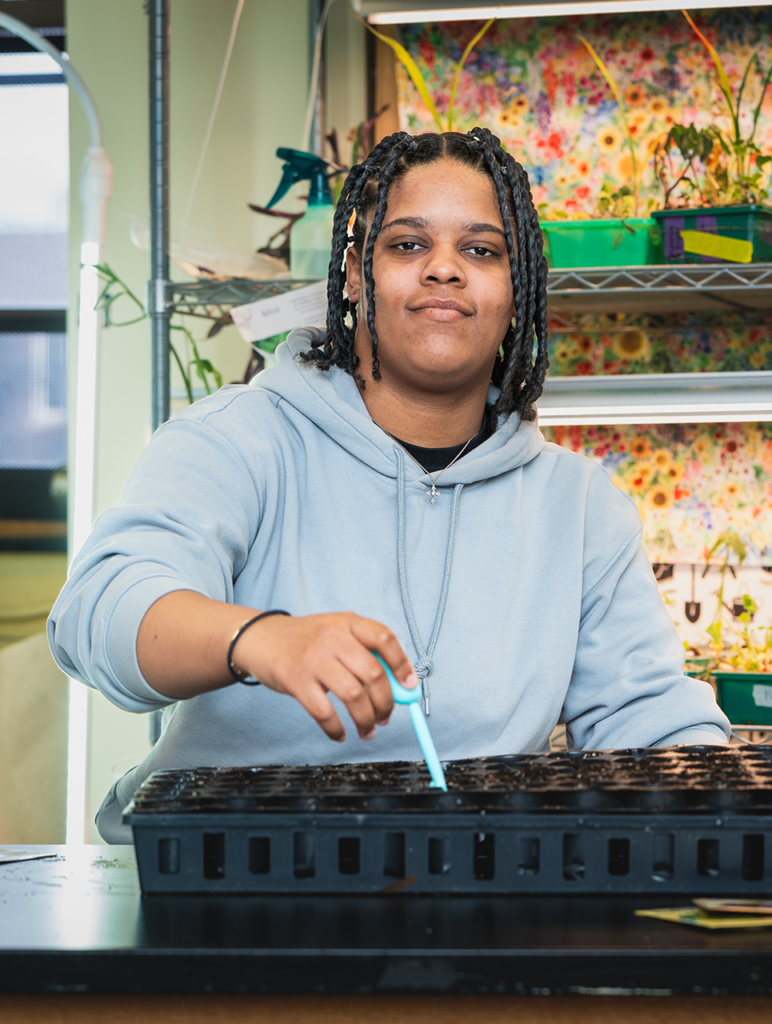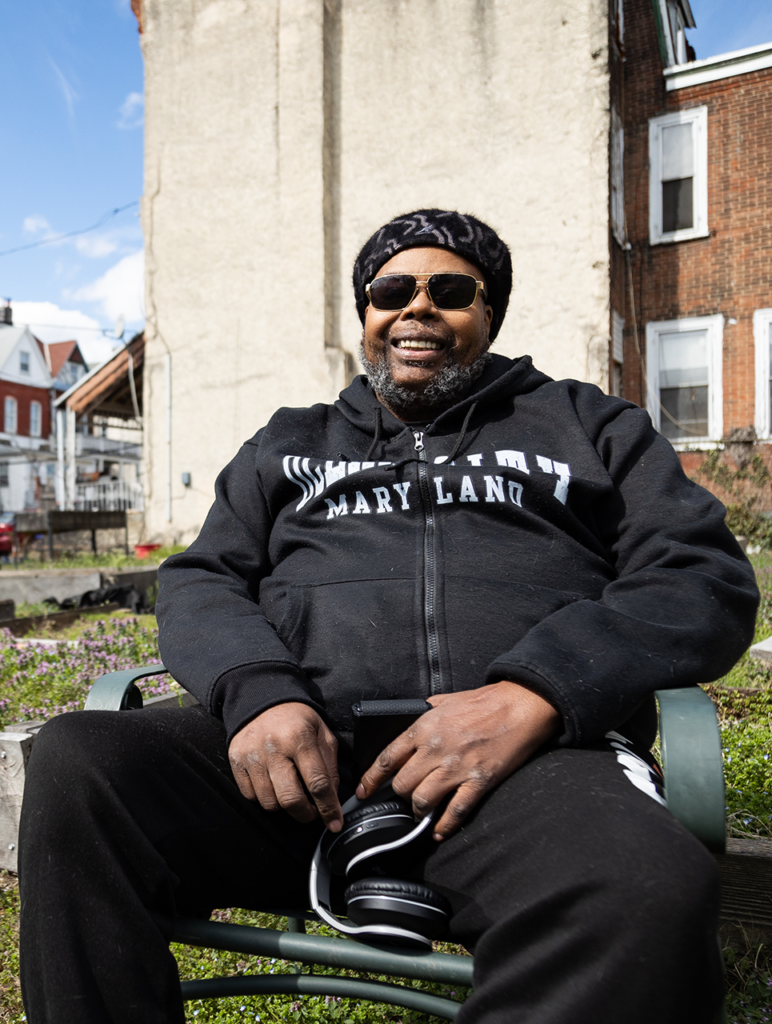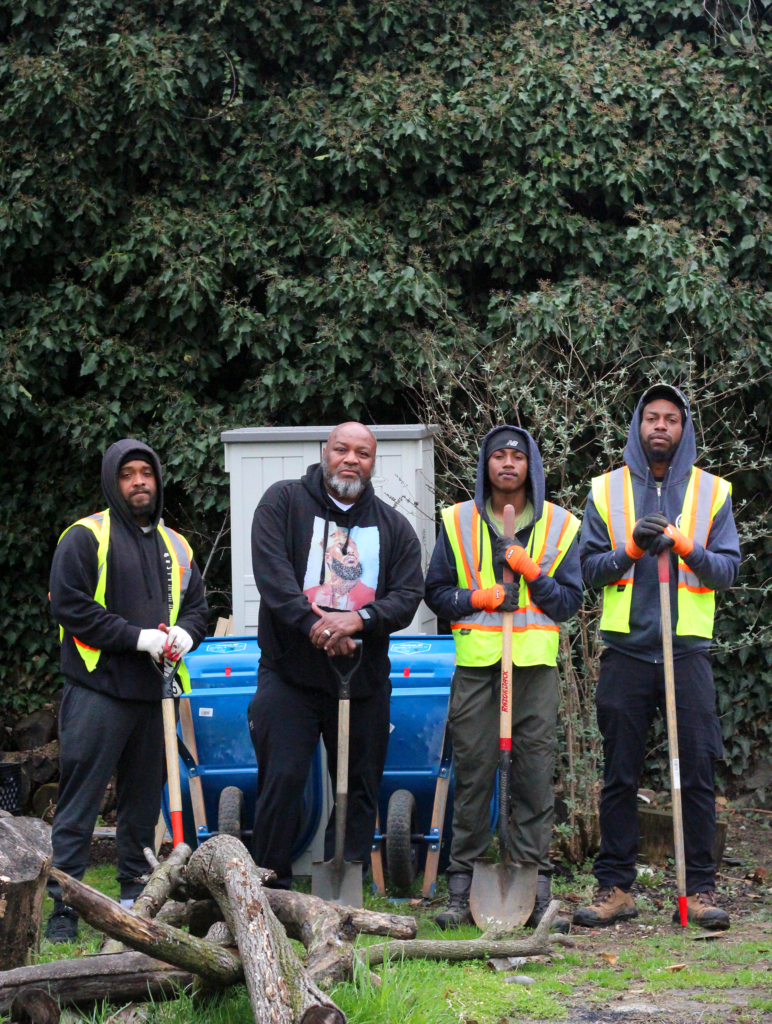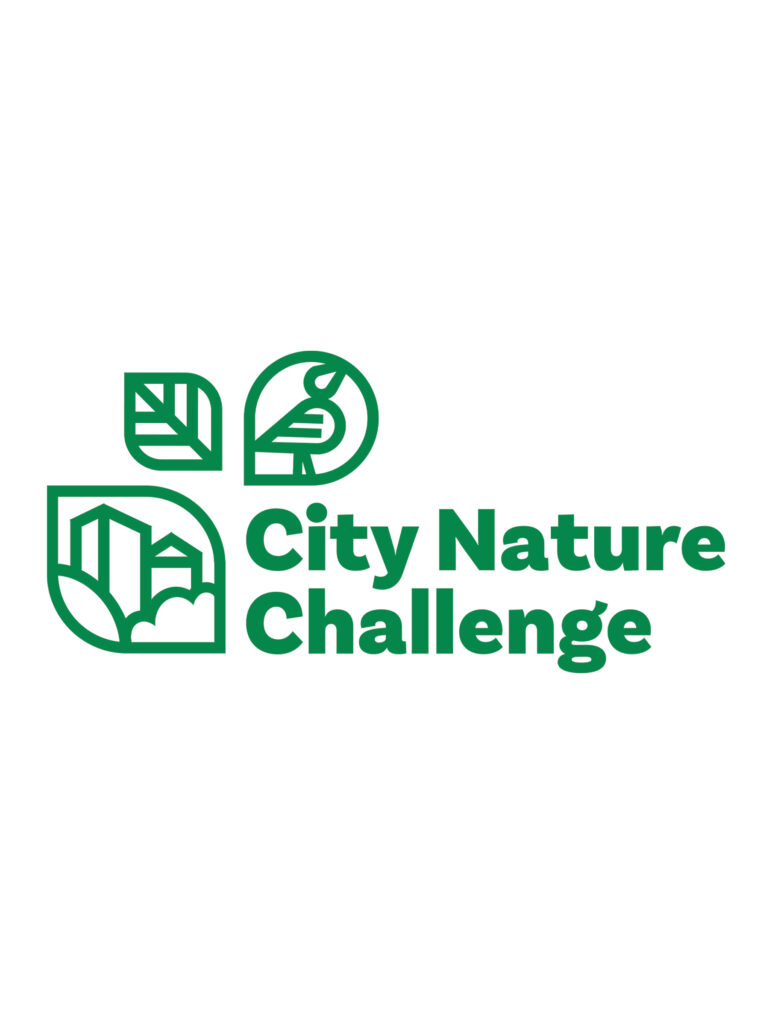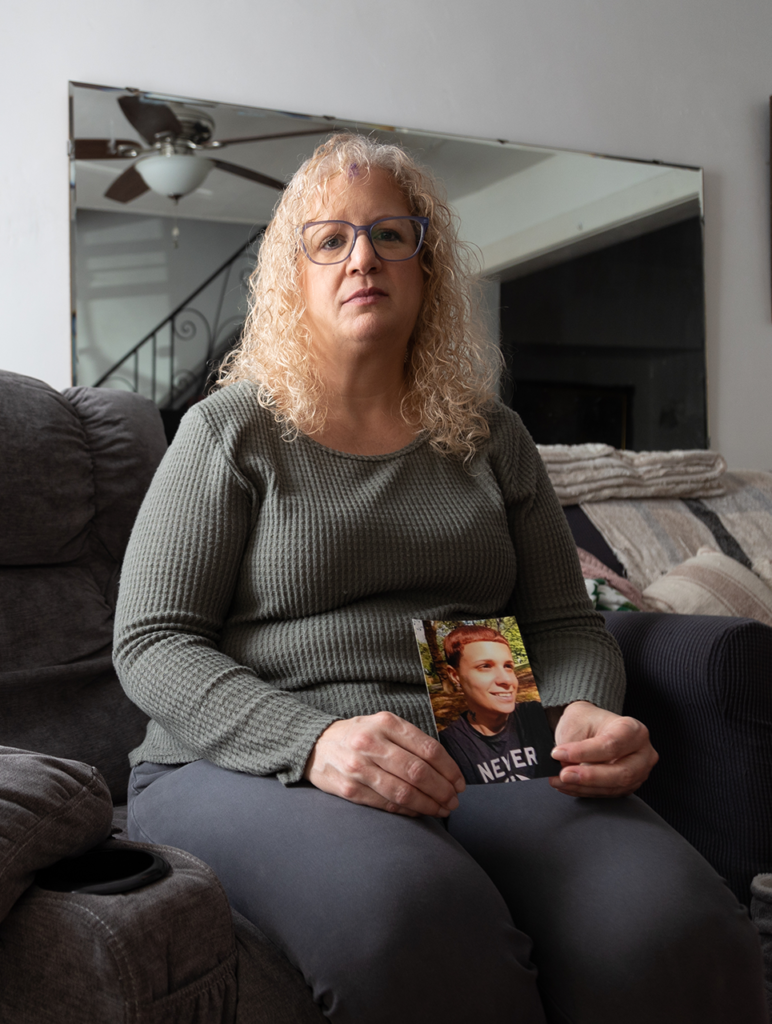Photo by JJ Tiziou Photography
Studio 34
by Marilyn Anthony
Our mind will deceive us,” says Angie Norris. “Our body will not.”
Norris, 45, is the studio manager at West Philadelphia’s cherished health, wellness and community center, Studio 34. Soft-spoken, but full of thoughtful passion, Norris says that she sees too often how people fail in their resolve to create a healthier life, undermined by the relentlessly critical mind we all harbor. She compares this scolding voice to an overbearing boss we have to teach ourselves to ignore.
“People will beat themselves up more than any other person in their life, and that is one of the greatest barriers to healing and wellness,” says Norris. “Self-compassion is one of the most important aspects of wellness, along with developing an awareness of our body. An awareness of how we feel—and allowing that to guide us.”
Yoga forms the core of programming at Studio 34, and manifestations are many: beginner classes, queer and trans yoga, yoga for recovery, chair yoga, and multiple forms of yoga teacher trainings. But Studio 34’s offerings also include Pilates, talk therapy, massage, a breastfeeding support group, African dance, and art and music shows.
Named for the trolley that rumbles past its location—and a nod to the glamour-filled haunt of Andy Warhol, Studio 54 in New York—Studio 34 began in 2008 as a vision shared by Norris and two other co-founders, sculptor James Peniston, 42, and yoga instructor Stephen Fisher, 47. Citing the growing feeling that Western medicine was focused more on disease than on wellness, Norris stepped away from her 20-year nursing career specializing in HIV treatment last September to join the staff full time.
One of the group’s chief aspirations was inclusivity, so they situated Studio 34 “halfway between those with resources and those without,” says Peniston. They strive to make wellness inviting to a population diverse in age, race, ethnicity and ability, and they want everyone who walks through the door to feel as though they belong.
When Norris hires a yoga instructor, she says she looks beyond their certification to a “vibe” that indicates a willingness to serve every person who may come to their class, whether they are 6 or 60. Norris admits they would like to attract even more people of color. “Your blind spots are your blind spots,” she says, “and you just don’t know what they are. ”
The neighborhood continues to evolve, and Norris and Peniston (Fisher has since left) want to make sure the studio keeps pace with changes. So far, membership growth has been organic, powered by people who find their first community here and then invite their friends in. Norris wants to figure out how to reach others, especially those “who never felt they belonged.”
When longtime Studio 34 members talk about their experiences, you get the sense that Norris’ message of self-acceptance and the studio’s conscious effort to create community is working. Instead of words like “pounds lost” or “inches trimmed,” you hear “beautiful,” “sweet,” “accepting,” “transformative” and “fun.”
One life center, many transformations
Former yoga teacher Jess Radovich, 33, who recently moved to Seattle, gets teary when she talks about her experience at Studio 34. She was a yoga novice when she first stepped through the doors, looking for help dealing with emotional turmoil.
“It’s the first place I learned how to relax, the place where I worked through grief about losing my father, confusion about getting married, issues of body image and injury, and major life issues,” she says. “The yoga practice that I developed at 34 changed my whole life, and I mean that in a very deep way.”
What distinguished Studio 34 for Radovich was the genuine sense of welcome and belonging. She valued practicing yoga in classes offering modifications and variations intended to accommodate different bodies, different abilities, and different backgrounds. In her view, Studio 34 offers a rich cross-section of the diverse racial, ethnic and socioeconomic elements of Philadelphia.
In 2010, Qui Alexander, now 29, was also looking for a place to reconnect with his life and body.
“As a queer and trans person of color,” Alexander says, “to see myself reflected in yoga was very hard to find.”
He thought a yoga studio would be intimidating, upscale and “fitnessy,” and, like most people, was nervous at the prospect of trying something new. In 2010, a friend encouraged him to take a yoga class at Studio 34, and he found “a place where you can go and take a deep breath and not have to worry.” More than that, Alexander found inspiration in the power of yoga. He is now an instructor at Studio 34, teaching what he believes is the only queer and trans yoga class in Philadelphia.
“When you see the changes in your physical body, you realize that you have power over your own body, and you can apply that power to other parts of your life. People have unhealthy habits—we’re human, that’s OK—but when you want to shift, yoga can help you do it at your own pace and do it in your own way. Yoga is for lots of different bodies. You can be fat and be healthy,” he says. His advice for all his students is simple: “I’m going to tell you to breathe and to take care of yourself in a way that’s genuine.”
Studio 34 also restored Jacques-Jean “JJ” Tiziou, 39, to mental and physical health by encouraging time for reflection. A professional photographer whose work was used to create the highly visible “How Philly Moves” mural at the Philadelphia Airport, Tiziou recalls how the transition from film to digital changed his working life.
“The darkroom used to provide me time to slow down,” says Tiziou. When digital photography eliminated the need for developing film, his life became an endless pursuit of images. He needed a way to break what had become an exhausting routine.
Before coming to Studio 34, Tiziou considered yoga a competitive activity. His new instructors offered a different, richer experience.
“The emphasis is not on some outward performance of twisting yourself into a pretzel,” he says. His instructors gave options enabling beginners to set their own limits and move at a safe, comfortable pace. “That ideally should be everyone’s experience with yoga practice,” Tiziou adds. He notes that the healing opportunities at Studio 34 go beyond yoga. “The intentionality of the lounge available for people to have a quiet safe space to sit and have a cup of tea, having acupuncture, massage therapists, wellness rooms for people to use,” he says, all demonstrates that, “a lot of heart equity has gone into that place.”
He’s now an avid Studio 34 member and a believer in spreading the message of wellness and inclusivity. “Yoga is a practice that by definition is—and should be—accessible to anyone who can breathe.”
In a conscious effort to eliminate the perceived exclusivity that often surrounds yoga, mats are free, water is free and the studio does not sell yoga clothes. Prices are inexpensive, membership options are flexible, coveted work exchange positions are sometimes available, and anyone
can drop in for a class. Norris laughingly admits that she is “always looking for new ways to give yoga away.”
Circles of support, sweat and laughter
On Sundays, the African Dance class is the big draw at Studio 34. Since 2009, it’s been taught by professional dancer and drummer Anssumane Silla. Originally from Guinea-Bissau in West Africa, Silla offers weekly dance instruction accompanied by a cohort of drummers playing traditional African drums such as djembe, dundun and kenkeni. He uses laughter, song, gentle teasing and a relaxed attitude to disarm his students and foster unselfconscious participation. Classes run for 90 minutes, long enough to work up a sweat and practice some moves in small groups. According to his wife, Nikki Silla, who attends every class with Jeneba, their 2-and-half-year-old daughter, participants come from across the tri-state area to enjoy the dance workout. “It’s all about having fun,” she says, and the small group size, ranging from six to 23 dancers, allows for a lot of interaction and personal attention.
Much of the programming here revolves around strong community. On the Wednesday before Christmas last year, 12 young women, many with infants, sat comfortably in a loose semicircle of armchairs and loveseats for the studio’s Mother-Baby Breastfeeding Connections sessions, which offer women a safe place for what can be difficult conversations about their lactation experience. Under the kindly direction of Patty Siegrist, staff nurse with the Birth Center in Bryn Mawr, the Studio 34 meeting room took on the feel of a cozy living room. Frequent laughter, occasional baby squawks and earnest talk characterized the session. This support group, running since 2009, is open without appointment and accepts donations as payment.
The studio owners believe that healing comes from surrounding yourself with others seeking their own wellness, whether that’s weight loss, playful relaxation or a sense of belonging.
Peniston says the energy people bring to Studio 34 is like having “hundreds and hundreds of workout buddies.” Norris adds that fun is always at the center of Studio 34, since for her and Peniston, it’s their “clubhouse” where they work to keep things light.
Norris and Peniston view their roles not as healers, per se, but as facilitators.
“We don’t heal anyone,” says Norris, “but we hold space for them, where they feel safe enough to do that work. You offer the space and the tools, and then people find that healing for themselves.”


